20170725使用linux的GDB打印STL(vector,map,set..................)
来源:互联网 发布:sleepytime mac 编辑:程序博客网 时间:2024/06/01 12:06
使用linux的GDB打印STL(vector,map,set..................)
转载地址:http://www.cnblogs.com/silentNight/p/5466418.html
声明:为了防止原博文撤销的情况,故转载到自己的博客中,如果涉及到侵权,请告知,立即删除
在linux用gdb或者cgdb计较不爽的地方是无法打印STL的东西,所有啊去网上找了找解决方案https://www.douban.com/note/182826844/?qq-pf-to=pcqq.c2c
本帖把怎么配置这个东西写出了
首先是下载gdb文件 https://sourceware.org/gdb/wiki/STLSupport ------》找到网页里面的
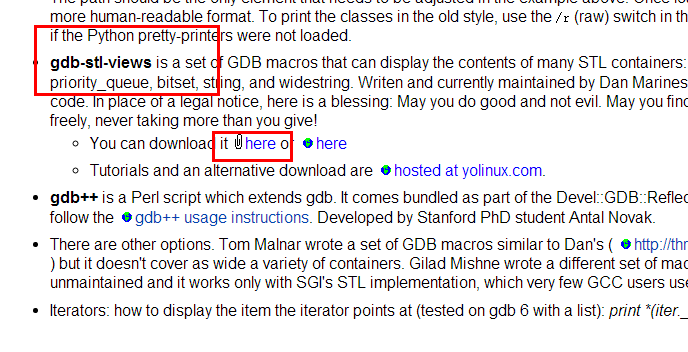 然后点击进去下载stl_views_1.0.3.gdb
然后点击进去下载stl_views_1.0.3.gdb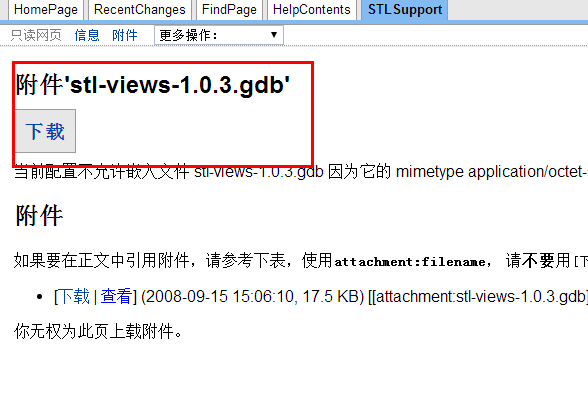
接下来把这个东西当到linux下,位置随便放,我放到了我的用户目录下
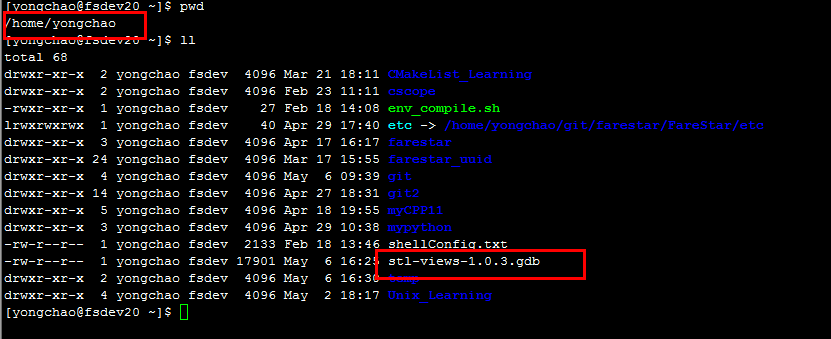
然后写一个小程序测试一下,
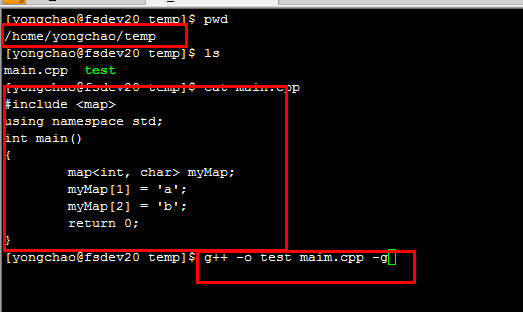
这里g++的命令是出现了错误:-bash:g++:command not found
采用命令 yum install gcc-c++.x86_64
安装好后即可以运行g++ -g main.cpp -o test 或者如文本中所示的 g++ -o test main.cpp -g
接着cgdb test 进入调试模式,然后加载刚才的stl_views_1.0.3.gdb
加载命令为:
source <path> :path为stl_views_1.0.3.gdb的路径
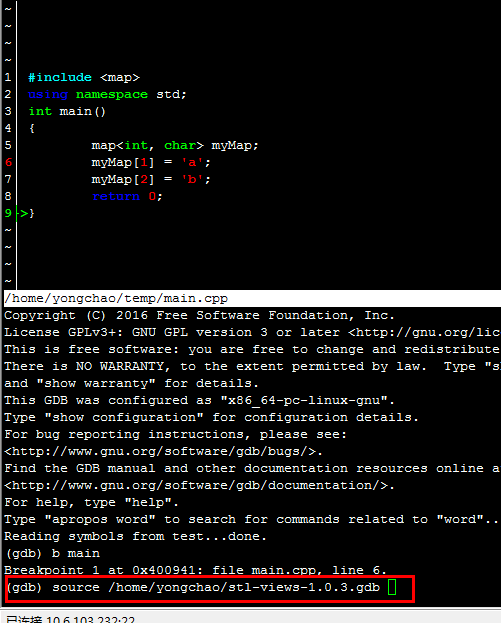
接着就可以看看pmap的命令了

pmap variable------------>打印variable这个map的定义和map里面的个数
pmap variable int int(就是单纯的两个int) ------------>打印pmap的元素和map的个数
pmap variable int int 20------------>打印索引是20的map的值 和map的个数
pmap variable int int 20 200------->打印索引是20 值是200的map值和map的个数
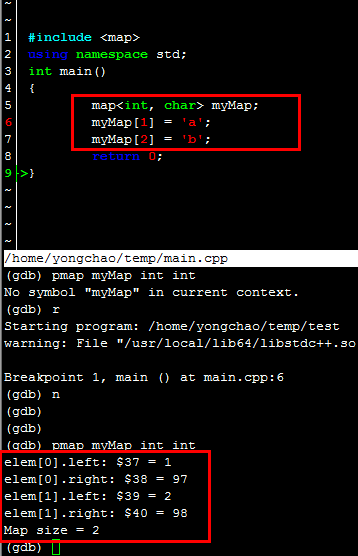
东西很好用,就怕以后链接失效找不到这个文件了,下面会把这个文件东西拷贝在下面。以后用到了,自己建立一个stl_views_1.0.3.gdb,然后把下面的东西拷贝进去使用。
# # STL GDB evaluators/views/utilities - 1.03## The new GDB commands: # are entirely non instrumental # do not depend on any "inline"(s) - e.g. size(), [], etc# are extremely tolerant to debugger settings# # This file should be "included" in .gdbinit as following:# source stl-views.gdb or just paste it into your .gdbinit file## The following STL containers are currently supported:## std::vector<T> -- via pvector command# std::list<T> -- via plist or plist_member command# std::map<T,T> -- via pmap or pmap_member command# std::multimap<T,T> -- via pmap or pmap_member command# std::set<T> -- via pset command# std::multiset<T> -- via pset command# std::deque<T> -- via pdequeue command# std::stack<T> -- via pstack command# std::queue<T> -- via pqueue command# std::priority_queue<T> -- via ppqueue command# std::bitset<n> -- via pbitset command# std::string -- via pstring command# std::widestring -- via pwstring command## The end of this file contains (optional) C++ beautifiers# Make sure your debugger supports $argc## Simple GDB Macros writen by Dan Marinescu (H-PhD) - License GPL# Inspired by intial work of Tom Malnar, # Tony Novac (PhD) / Cornell / Stanford,# Gilad Mishne (PhD) and Many Many Others.# Contact: dan_c_marinescu@yahoo.com (Subject: STL)## Modified to work with g++ 4.3 by Anders Elton# Also added _member functions, that instead of printing the entire class in map, prints a member.## std::vector<>#define pvector if $argc == 0 help pvector else set $size = $arg0._M_impl._M_finish - $arg0._M_impl._M_start set $capacity = $arg0._M_impl._M_end_of_storage - $arg0._M_impl._M_start set $size_max = $size - 1 end if $argc == 1 set $i = 0 while $i < $size printf "elem[%u]: ", $i p *($arg0._M_impl._M_start + $i) set $i++ end end if $argc == 2 set $idx = $arg1 if $idx < 0 || $idx > $size_max printf "idx1, idx2 are not in acceptable range: [0..%u].\n", $size_max else printf "elem[%u]: ", $idx p *($arg0._M_impl._M_start + $idx) end end if $argc == 3 set $start_idx = $arg1 set $stop_idx = $arg2 if $start_idx > $stop_idx set $tmp_idx = $start_idx set $start_idx = $stop_idx set $stop_idx = $tmp_idx end if $start_idx < 0 || $stop_idx < 0 || $start_idx > $size_max || $stop_idx > $size_max printf "idx1, idx2 are not in acceptable range: [0..%u].\n", $size_max else set $i = $start_idx while $i <= $stop_idx printf "elem[%u]: ", $i p *($arg0._M_impl._M_start + $i) set $i++ end end end if $argc > 0 printf "Vector size = %u\n", $size printf "Vector capacity = %u\n", $capacity printf "Element " whatis $arg0._M_impl._M_start endenddocument pvector Prints std::vector<T> information. Syntax: pvector <vector> <idx1> <idx2> Note: idx, idx1 and idx2 must be in acceptable range [0..<vector>.size()-1]. Examples: pvector v - Prints vector content, size, capacity and T typedef pvector v 0 - Prints element[idx] from vector pvector v 1 2 - Prints elements in range [idx1..idx2] from vectorend ## std::list<>#define plist if $argc == 0 help plist else set $head = &$arg0._M_impl._M_node set $current = $arg0._M_impl._M_node._M_next set $size = 0 while $current != $head if $argc == 2 printf "elem[%u]: ", $size p *($arg1*)($current + 1) end if $argc == 3 if $size == $arg2 printf "elem[%u]: ", $size p *($arg1*)($current + 1) end end set $current = $current._M_next set $size++ end printf "List size = %u \n", $size if $argc == 1 printf "List " whatis $arg0 printf "Use plist <variable_name> <element_type> to see the elements in the list.\n" end endenddocument plist Prints std::list<T> information. Syntax: plist <list> <T> <idx>: Prints list size, if T defined all elements or just element at idx Examples: plist l - prints list size and definition plist l int - prints all elements and list size plist l int 2 - prints the third element in the list (if exists) and list sizeenddefine plist_member if $argc == 0 help plist_member else set $head = &$arg0._M_impl._M_node set $current = $arg0._M_impl._M_node._M_next set $size = 0 while $current != $head if $argc == 3 printf "elem[%u]: ", $size p (*($arg1*)($current + 1)).$arg2 end if $argc == 4 if $size == $arg3 printf "elem[%u]: ", $size p (*($arg1*)($current + 1)).$arg2 end end set $current = $current._M_next set $size++ end printf "List size = %u \n", $size if $argc == 1 printf "List " whatis $arg0 printf "Use plist_member <variable_name> <element_type> <member> to see the elements in the list.\n" end endenddocument plist_member Prints std::list<T> information. Syntax: plist <list> <T> <idx>: Prints list size, if T defined all elements or just element at idx Examples: plist_member l int member - prints all elements and list size plist_member l int member 2 - prints the third element in the list (if exists) and list sizeend## std::map and std::multimap#define pmap if $argc == 0 help pmap else set $tree = $arg0 set $i = 0 set $node = $tree._M_t._M_impl._M_header._M_left set $end = $tree._M_t._M_impl._M_header set $tree_size = $tree._M_t._M_impl._M_node_count if $argc == 1 printf "Map " whatis $tree printf "Use pmap <variable_name> <left_element_type> <right_element_type> to see the elements in the map.\n" end if $argc == 3 while $i < $tree_size set $value = (void *)($node + 1) printf "elem[%u].left: ", $i p *($arg1*)$value set $value = $value + sizeof($arg1) printf "elem[%u].right: ", $i p *($arg2*)$value if $node._M_right != 0 set $node = $node._M_right while $node._M_left != 0 set $node = $node._M_left end else set $tmp_node = $node._M_parent while $node == $tmp_node._M_right set $node = $tmp_node set $tmp_node = $tmp_node._M_parent end if $node._M_right != $tmp_node set $node = $tmp_node end end set $i++ end end if $argc == 4 set $idx = $arg3 set $ElementsFound = 0 while $i < $tree_size set $value = (void *)($node + 1) if *($arg1*)$value == $idx printf "elem[%u].left: ", $i p *($arg1*)$value set $value = $value + sizeof($arg1) printf "elem[%u].right: ", $i p *($arg2*)$value set $ElementsFound++ end if $node._M_right != 0 set $node = $node._M_right while $node._M_left != 0 set $node = $node._M_left end else set $tmp_node = $node._M_parent while $node == $tmp_node._M_right set $node = $tmp_node set $tmp_node = $tmp_node._M_parent end if $node._M_right != $tmp_node set $node = $tmp_node end end set $i++ end printf "Number of elements found = %u\n", $ElementsFound end if $argc == 5 set $idx1 = $arg3 set $idx2 = $arg4 set $ElementsFound = 0 while $i < $tree_size set $value = (void *)($node + 1) set $valueLeft = *($arg1*)$value set $valueRight = *($arg2*)($value + sizeof($arg1)) if $valueLeft == $idx1 && $valueRight == $idx2 printf "elem[%u].left: ", $i p $valueLeft printf "elem[%u].right: ", $i p $valueRight set $ElementsFound++ end if $node._M_right != 0 set $node = $node._M_right while $node._M_left != 0 set $node = $node._M_left end else set $tmp_node = $node._M_parent while $node == $tmp_node._M_right set $node = $tmp_node set $tmp_node = $tmp_node._M_parent end if $node._M_right != $tmp_node set $node = $tmp_node end end set $i++ end printf "Number of elements found = %u\n", $ElementsFound end printf "Map size = %u\n", $tree_size endenddocument pmap Prints std::map<TLeft and TRight> or std::multimap<TLeft and TRight> information. Works for std::multimap as well. Syntax: pmap <map> <TtypeLeft> <TypeRight> <valLeft> <valRight>: Prints map size, if T defined all elements or just element(s) with val(s) Examples: pmap m - prints map size and definition pmap m int int - prints all elements and map size pmap m int int 20 - prints the element(s) with left-value = 20 (if any) and map size pmap m int int 20 200 - prints the element(s) with left-value = 20 and right-value = 200 (if any) and map sizeenddefine pmap_member if $argc == 0 help pmap_member else set $tree = $arg0 set $i = 0 set $node = $tree._M_t._M_impl._M_header._M_left set $end = $tree._M_t._M_impl._M_header set $tree_size = $tree._M_t._M_impl._M_node_count if $argc == 1 printf "Map " whatis $tree printf "Use pmap <variable_name> <left_element_type> <right_element_type> to see the elements in the map.\n" end if $argc == 5 while $i < $tree_size set $value = (void *)($node + 1) printf "elem[%u].left: ", $i p (*($arg1*)$value).$arg2 set $value = $value + sizeof($arg1) printf "elem[%u].right: ", $i p (*($arg3*)$value).$arg4 if $node._M_right != 0 set $node = $node._M_right while $node._M_left != 0 set $node = $node._M_left end else set $tmp_node = $node._M_parent while $node == $tmp_node._M_right set $node = $tmp_node set $tmp_node = $tmp_node._M_parent end if $node._M_right != $tmp_node set $node = $tmp_node end end set $i++ end end if $argc == 6 set $idx = $arg5 set $ElementsFound = 0 while $i < $tree_size set $value = (void *)($node + 1) if *($arg1*)$value == $idx printf "elem[%u].left: ", $i p (*($arg1*)$value).$arg2 set $value = $value + sizeof($arg1) printf "elem[%u].right: ", $i p (*($arg3*)$value).$arg4 set $ElementsFound++ end if $node._M_right != 0 set $node = $node._M_right while $node._M_left != 0 set $node = $node._M_left end else set $tmp_node = $node._M_parent while $node == $tmp_node._M_right set $node = $tmp_node set $tmp_node = $tmp_node._M_parent end if $node._M_right != $tmp_node set $node = $tmp_node end end set $i++ end printf "Number of elements found = %u\n", $ElementsFound end printf "Map size = %u\n", $tree_size endenddocument pmap_member Prints std::map<TLeft and TRight> or std::multimap<TLeft and TRight> information. Works for std::multimap as well. Syntax: pmap <map> <TtypeLeft> <TypeRight> <valLeft> <valRight>: Prints map size, if T defined all elements or just element(s) with val(s) Examples: pmap_member m class1 member1 class2 member2 - prints class1.member1 : class2.member2 pmap_member m class1 member1 class2 member2 lvalue - prints class1.member1 : class2.member2 where class1 == lvalueend## std::set and std::multiset#define pset if $argc == 0 help pset else set $tree = $arg0 set $i = 0 set $node = $tree._M_t._M_impl._M_header._M_left set $end = $tree._M_t._M_impl._M_header set $tree_size = $tree._M_t._M_impl._M_node_count if $argc == 1 printf "Set " whatis $tree printf "Use pset <variable_name> <element_type> to see the elements in the set.\n" end if $argc == 2 while $i < $tree_size set $value = (void *)($node + 1) printf "elem[%u]: ", $i p *($arg1*)$value if $node._M_right != 0 set $node = $node._M_right while $node._M_left != 0 set $node = $node._M_left end else set $tmp_node = $node._M_parent while $node == $tmp_node._M_right set $node = $tmp_node set $tmp_node = $tmp_node._M_parent end if $node._M_right != $tmp_node set $node = $tmp_node end end set $i++ end end if $argc == 3 set $idx = $arg2 set $ElementsFound = 0 while $i < $tree_size set $value = (void *)($node + 1) if *($arg1*)$value == $idx printf "elem[%u]: ", $i p *($arg1*)$value set $ElementsFound++ end if $node._M_right != 0 set $node = $node._M_right while $node._M_left != 0 set $node = $node._M_left end else set $tmp_node = $node._M_parent while $node == $tmp_node._M_right set $node = $tmp_node set $tmp_node = $tmp_node._M_parent end if $node._M_right != $tmp_node set $node = $tmp_node end end set $i++ end printf "Number of elements found = %u\n", $ElementsFound end printf "Set size = %u\n", $tree_size endenddocument pset Prints std::set<T> or std::multiset<T> information. Works for std::multiset as well. Syntax: pset <set> <T> <val>: Prints set size, if T defined all elements or just element(s) having val Examples: pset s - prints set size and definition pset s int - prints all elements and the size of s pset s int 20 - prints the element(s) with value = 20 (if any) and the size of send## std::dequeue#define pdequeue if $argc == 0 help pdequeue else set $size = 0 set $start_cur = $arg0._M_impl._M_start._M_cur set $start_last = $arg0._M_impl._M_start._M_last set $start_stop = $start_last while $start_cur != $start_stop p *$start_cur set $start_cur++ set $size++ end set $finish_first = $arg0._M_impl._M_finish._M_first set $finish_cur = $arg0._M_impl._M_finish._M_cur set $finish_last = $arg0._M_impl._M_finish._M_last if $finish_cur < $finish_last set $finish_stop = $finish_cur else set $finish_stop = $finish_last end while $finish_first != $finish_stop p *$finish_first set $finish_first++ set $size++ end printf "Dequeue size = %u\n", $size endenddocument pdequeue Prints std::dequeue<T> information. Syntax: pdequeue <dequeue>: Prints dequeue size, if T defined all elements Deque elements are listed "left to right" (left-most stands for front and right-most stands for back) Example: pdequeue d - prints all elements and size of dend## std::stack#define pstack if $argc == 0 help pstack else set $start_cur = $arg0.c._M_impl._M_start._M_cur set $finish_cur = $arg0.c._M_impl._M_finish._M_cur set $size = $finish_cur - $start_cur set $i = $size - 1 while $i >= 0 p *($start_cur + $i) set $i-- end printf "Stack size = %u\n", $size endenddocument pstack Prints std::stack<T> information. Syntax: pstack <stack>: Prints all elements and size of the stack Stack elements are listed "top to buttom" (top-most element is the first to come on pop) Example: pstack s - prints all elements and the size of send## std::queue#define pqueue if $argc == 0 help pqueue else set $start_cur = $arg0.c._M_impl._M_start._M_cur set $finish_cur = $arg0.c._M_impl._M_finish._M_cur set $size = $finish_cur - $start_cur set $i = 0 while $i < $size p *($start_cur + $i) set $i++ end printf "Queue size = %u\n", $size endenddocument pqueue Prints std::queue<T> information. Syntax: pqueue <queue>: Prints all elements and the size of the queue Queue elements are listed "top to bottom" (top-most element is the first to come on pop) Example: pqueue q - prints all elements and the size of qend## std::priority_queue#define ppqueue if $argc == 0 help ppqueue else set $size = $arg0.c._M_impl._M_finish - $arg0.c._M_impl._M_start set $capacity = $arg0.c._M_impl._M_end_of_storage - $arg0.c._M_impl._M_start set $i = $size - 1 while $i >= 0 p *($arg0.c._M_impl._M_start + $i) set $i-- end printf "Priority queue size = %u\n", $size printf "Priority queue capacity = %u\n", $capacity endenddocument ppqueue Prints std::priority_queue<T> information. Syntax: ppqueue <priority_queue>: Prints all elements, size and capacity of the priority_queue Priority_queue elements are listed "top to buttom" (top-most element is the first to come on pop) Example: ppqueue pq - prints all elements, size and capacity of pqend## std::bitset#define pbitset if $argc == 0 help pbitset else p /t $arg0._M_w endenddocument pbitset Prints std::bitset<n> information. Syntax: pbitset <bitset>: Prints all bits in bitset Example: pbitset b - prints all bits in bend## std::string#define pstring if $argc == 0 help pstring else printf "String \t\t\t= \"%s\"\n", $arg0._M_data() printf "String size/length \t= %u\n", $arg0._M_rep()._M_length printf "String capacity \t= %u\n", $arg0._M_rep()._M_capacity printf "String ref-count \t= %d\n", $arg0._M_rep()._M_refcount endenddocument pstring Prints std::string information. Syntax: pstring <string> Example: pstring s - Prints content, size/length, capacity and ref-count of string send ## std::wstring#define pwstring if $argc == 0 help pwstring else call printf("WString \t\t= \"%ls\"\n", $arg0._M_data()) printf "WString size/length \t= %u\n", $arg0._M_rep()._M_length printf "WString capacity \t= %u\n", $arg0._M_rep()._M_capacity printf "WString ref-count \t= %d\n", $arg0._M_rep()._M_refcount endenddocument pwstring Prints std::wstring information. Syntax: pwstring <wstring> Example: pwstring s - Prints content, size/length, capacity and ref-count of wstring send ## C++ related beautifiers (optional)#set print pretty onset print object onset print static-members onset print vtbl onset print demangle onset demangle-style gnu-v3set print sevenbit-strings off
- 20170725使用linux的GDB打印STL(vector,map,set..................)
- 使用linux的GDB打印STL(vector,map,set..................)
- GDB STL vector打印
- GDB STL vector打印
- GDB STL vector打印
- STL容器 list、vector、map、set 使用的陷阱
- vector map set的使用
- STL set的使用 vector List set map 成员函数erase
- 《 set/map 的使用 ----STL》
- STL(vector、set、map)----hdu4585
- UVa156 map set vector/STL
- C++ STL容器的学习使用(vector、queue、list、set、map)
- Map Vector Set (离散的使用)
- [转]STL中的常用的vector,map,set,Sort用法
- STL中的常用的vector,map,set,Sort用法(转)
- STL中的常用的vector,map,set,Sort用法
- STL中的常用的vector,map,set,Sort用法收藏
- STL中List,Vector,Map,Set的理解
- 文章标题
- Java中Filter、Listener,拦截器的学习
- USACO-Section2.2 Party Lamps【深度优先搜索】
- 3——FFMPEG之解复用器-----AVInputFormat
- Qt开发: 添加程序图标ico -【图文并茂】
- 20170725使用linux的GDB打印STL(vector,map,set..................)
- JavaWeb做导出功能时直接跳转新页面并显示乱码?
- 可视化存储智能解决方案之一“大话Raid2.0”
- Windows Message Queue
- H5 头像上传(支持裁切)
- POJ-1984-Navigation Nightmare [带权并查集]
- python分布式进程(windows下)
- React 检测页面传值参数
- 生成字符串和文件的MD5



